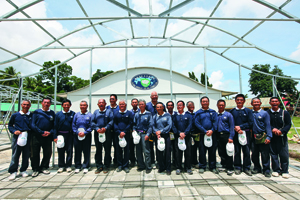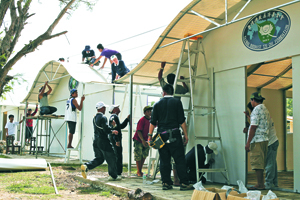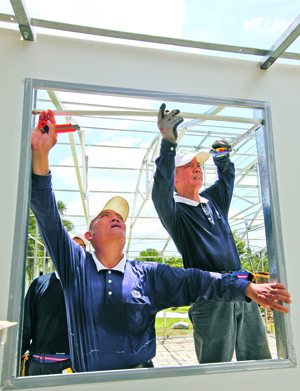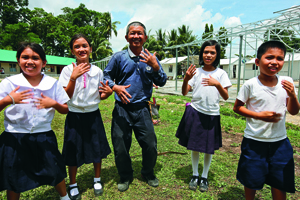

| Blue-Collar, White-Collar | ||||||||
| By Li Wei-huang Translated by Tang Yau-yang Photos by Lin Yan-huang | ||||||||
These volunteers from Taiwan, almost all of them over 50, extended the love they have for their own children and grandchildren to students at Bohol schools—they assembled prefabricated classrooms for the students to use after their classrooms were damaged by a devastating earthquake. Bohol residents treated the volunteers from afar like celebrities and made them feel very welcome.
From June 10 to 18, 2014, a group of 20 volunteers from Taiwan trained residents in Bohol to assemble prefabricated classrooms. The classrooms were provided by Tzu Chi for 16 local schools which had all sustained significant damage in a temblor that devastated Bohol in October 2013. The town of Loon, hit especially hard by the quake, received more classrooms than any other town. Sandingan National High School, one of the schools in Loon, received 12 classrooms. Li Jie-yu (李界育), from Taichung, central Taiwan, assembled one of the classrooms on an open space at the high school. He wore a tool belt, a white cap, and a cloth wrapped over much of his face to block the scorching sun. Proper sun screening was advisable because the volunteers worked long hours in the sun. Li worked quietly, using a drill motor to drive in screws. It wasn’t the language barrier that prevented him from conversing with local residents—he was just taciturn by nature.
Li, who deals in used car parts in his real day job, left Taiwan for the first time in his life to volunteer in Leyte Province after Super Typhoon Haiyan hit central Philippines in November 2013. Tzu Chi provided prefabricated classrooms for Tacloban and Ormoc in Leyte, and Li was among the volunteers who went to help put the classrooms together. He made two trips to that area. In June 2014, he went to the Philippines a third time, this time to Bohol Island to help erect classrooms. He was impressed by the attention of the local people. Students gathered around as he worked. When he accidentally dropped a screw, the youngsters would race to be the first to pick it up for him. Many villagers watched him work as if he were putting on a show. When the classrooms at one school were completed and turned over to the administration, the Taiwanese volunteers were treated as if they were big stars. “I felt so flattered!” Li said. Like all Tzu Chi volunteers, he cheerfully paid his own travel expenses and took time off from his job to participate in the project. Thus the warm reception by the villagers made it all even more worthwhile.
Relief work abroad Zeng Ming-song (曾明松) is another volunteer from Taiwan. He has run a motorcycle repair shop for the past 30 years in Nantou, also in central Taiwan. Like Li Jie-yu, Zeng took his first trip abroad to help assemble prefabricated classrooms in Leyte. He used to work in his shop from 8:00 in the morning till 10:00 in the evening, day after day, including weekends. But that schedule changed after he joined Tzu Chi. Nowadays he shuts his shop down on Sundays so that he and his wife can volunteer at Tzu Chi free clinics or recycling stations. On weekday evenings, he often has to attend Tzu Chi meetings, visit needy families, and chant sutras for the deceased. On those days, he just puts his work behind him and goes out to volunteer. His wife can’t repair motorcycles, but she can change motor oil, so she is able to serve some customers. When both he and his wife have to volunteer, he simply closes his shop. Zeng said that volunteering has become their primary job over the years, while tending the repair shop has been relegated to a secondary role. He pointed out that they are not rich, but they have learned to see money for what it really is. They used to take advantage of every opportunity to make money, but they were unable to keep what they made. They loaned out their money and ended up losing it all to defaults. They now believe the truth of a popular saying: “Money has four legs and people have only two.” It’s useless to chase money. If something is meant to be yours, it is yours; if not, it’s a waste of time to fret over it. They are therefore completely at ease now about closing their shop to go do volunteer work. For this trip to Bohol, Zeng had packed his backpack with pencils, candies, and hanging decorations with aphorisms by Master Cheng Yen. He gave them to students or teachers whenever he had a chance. He cherished this trip to help people in Bohol. “Wealth doesn’t guarantee a slot on the delegation,” he said of his good fortune to have the opportunity to serve. Lai Han-xiang (賴瀚祥), from Taichung, was an ironworker and then a plumber before switching to selling Chinese flatbread 20 years ago. His business was very good, so he and his staff needed to run in high gear to fill all the orders each day. All hands were needed to keep his store humming; even one person taking time off work was unthinkable. As a result, “I rarely went anywhere far from home,” he said. But Lai’s involvement with Tzu Chi changed that. Like the other volunteers, he went to Leyte to build prefabricated classrooms in 2013. At one of the schools he worked at, he saw over 60 crosses that had been erected on the campus. He later found out that each cross represented a student of the school who had perished in the super storm. That really saddened him. Every time he thought of that scene, he reminded himself to seize time to do good. He signed up for disaster relief work in the Philippines three times, and he was selected each time. He felt that he had been extremely fortunate to have been selected three times in a row, especially considering all the volunteers who wanted to participate. His “reward” for being selected to participate was a chance to spend his own money and use his own time to work in heat that reached 90 or 100 degrees Fahrenheit. He often got heat stress while putting up classrooms under the scorching sun, but he stayed at the work sites with the other volunteers and did his best. He did not want to have traveled so far only to end up lying in bed. “During this trip, the only thing I worry about is that my health or strength might fail me,” he said.
Sun and sweat This was also the third time that Cai Bo-chang (蔡泊昌), from Qingshui, Taichung, had been to the Philippines. However, his state of mind this time was vastly different from that during his previous two trips. His wife of 42 years had just passed away. Thinking of her while assembling classrooms in Bohol, he often could not stop his tears from falling. He regretted not having been a more considerate husband to her. He had thought nothing of spending lavishly on liquor, but he had not once taken her out to a nice dinner. Now he carried her picture around in his billfold. He told himself to volunteer doubly hard, both on her behalf and on his own. When he first arrived in Bohol, Cai saw how classes at local schools were conducted outdoors. The teachers and students had only flimsy, makeshift shields, such as tarps hanging overhead, that were often grossly inadequate in blocking out the sun. Students were forced to move their seats with the moving sun to stay out of the heat and the bright light as much as they could. Conducting classes under tarps day after day was not very pleasant, and it certainly was not conducive to effective teaching and learning. It was no wonder that students moved their desks and chairs into a classroom just as soon as one was completed. They did not want to wait one second longer. Their eagerness to get inside a classroom helped Cai appreciate the extreme urgency of his task, so he worked particularly hard. But however busy he was, he never forgot to regularly take his medications to control his blood pressure and blood sugar so that he could handle the hard work.
These Taiwanese volunteers all had had experience working with their hands, with tools, and with heavy things. That, however, was not the case with Chen You-ji (陳佑吉). He used to work mostly with his head, not hands. He retired from his position as the chief financial officer of a company in 2012. Before that, he had spent 15 years working abroad while his wife had stayed in Taiwan. When he returned to Taiwan on vacation, he felt left out because his wife was often busily volunteering for Tzu Chi. He admitted that for a long time he had been mad at the foundation over that. After he retired, he started volunteering at a Tzu Chi recycling station, and so he and his wife were both volunteers. He had wanted to help in international disaster relief work, so he was very glad he was selected to come to Bohol this time. They worked all day long with only a brief break for lunch. The volunteers were thus exposed to the hot sun almost the entire day. Their clothes were alternately soaked from their sweat and dried by the sun before becoming soaked again. Many volunteers developed rashes as a result. After working hard all day, they fell asleep as soon as they hit the sack. Their exhaustion was understandable. Prolonged exertion in heat like that could exhaust even the fittest young men, let alone these volunteers. They were mostly in their 50s and 60s, and some were even grandfathers. Though they were physically tired, they took delight in seeing the immediate impact of their labor. They were happy that they had done the right thing.
|















|




